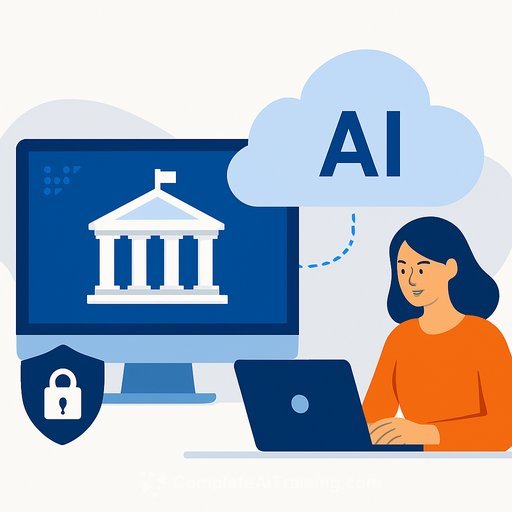Building trustworthy technology: How AI and data can improve government
AI is already changing how public services are delivered. The hard part isn't the tech. It's building the trust, data foundations, and skills that make the tech useful - and safe - for citizens and frontline teams.
The goal is simple: make services more efficient, fairer, and more responsive. That takes shared data standards, clear accountability, and proof that new systems actually save time and improve outcomes.
Treat data as national infrastructure
Data and AI should be treated like roads or rails: built, funded, and maintained for public benefit. When data is fragmented, outdated, or locked up, every service that relies on it suffers. When it's accessible, interoperable, and well-stewarded, performance improves across the board.
The OpenActive standards for physical activity show what this looks like in practice. Backed by Sport England and the National Lottery and stewarded by the ODI, they connect thousands of operators, local authorities, and platforms - creating millions of bookable opportunities each month. Integrated with NHS systems, this makes it easier for GPs and link workers to prescribe activity, easing pressure on services and improving wellbeing. In a pilot, social prescribing link workers saved up to 50% of their time.
Apply the same playbook to volunteering, education, or social care and you get a system where people can quickly find and access the right local support. That's real value: time saved, better outcomes, and higher trust.
NHS England: Social prescribing
What open banking teaches government
Ten years ago, banking was dominated by a few large providers. Opening up data safely - with clear standards and smart data access - changed that. Millions now use services powered by open banking, often without noticing, to save, borrow, and budget more effectively.
The public sector can mirror this. Link data on income, housing, debt, and fuel expenses and you can target support faster and with greater accuracy. Pair that with standardised open data and third parties can build tools that help households plan and build resilience. The key is trust: assurance, stewardship, and user control - not just regulation.
Why digital reforms stall
Most failures aren't technical. They happen because teams build in silos, skip shared standards, and underestimate the work needed to earn trust. Frontline staff won't use new tools unless they're transparent, accessible, and clearly reduce workload.
People will share data when they see how it helps them - and when they know how it's protected, audited, and governed. That requires visible assurance, not just promises.
Build the conditions for trust
- Open up anonymised datasets to researchers and civil society. Bias hides in plain sight unless you let others test the inputs and outcomes.
- Adopt assurance mechanisms: independent audits, data quality kitemarks, and clear routes for redress when things go wrong.
- Stand up or support data institutions to steward rights, enforce ethical use, and act in the public interest.
- Set standards once; apply everywhere. Interoperability shouldn't be optional.
The UK is already strong on standards in law, finance, and governance. We can lead on data assurance too - by building trusted systems that let innovation move faster, not looser.
Make digital reform work in practice
Start with the basics. Connectivity so geography doesn't decide opportunity. Open standards so systems can talk to each other. And data skills for policymakers, product teams, and frontline managers - not just engineers.
- Fund shared data standards and the teams that maintain them (not just one-off builds).
- Mandate assurance for AI systems used in eligibility, enforcement, and resource allocation.
- Pilot with real users, publish the results, and scale only when time and outcomes improve.
- Co-design with frontline staff; measure hours saved, error rates, and user satisfaction.
- Open procurement to civic tech and SMEs, with fair risk-reward sharing and transparent performance clauses.
- Report publicly on model performance, bias testing, and incident handling.
90-day action plan for government teams
- Inventory critical datasets; flag duplicates, gaps, and access barriers. Pick one service to improve with open standards.
- Set up a lightweight assurance framework: audit trail, data quality checks, explainability docs, and an incident process.
- Run a live pilot where AI saves staff time (e.g., triaging correspondence or appointment booking). Measure and publish the results.
- Form a cross-functional working group (policy, delivery, legal, data) to agree standards and success metrics.
- Invest in skills: short, practical training for non-technical staff on data literacy, prompts, and risk assessment.
Skills are the multiplier
AI won't fix weak processes or poor data. People do. Equip policy and delivery teams to ask better questions, read model outputs critically, and spot risk early.
If you're building capability across roles, see curated options for public-sector-friendly training paths here: Complete AI Training - courses by job.
Partnerships that actually deliver
Government can't do this alone. Budgets are tight and priorities shift. The answer is smart partnerships with business, academia, and civic tech - built on fairness and transparency, not vendor lock-in.
- Use open standards and open APIs to avoid dependency risks.
- Write contracts that share upside and hold everyone to measurable outcomes.
- Keep citizens in the loop: clear consent flows, easy opt-outs, and plain-English explanations.
The outcome that matters
Do the basics well - connectivity, interoperability, open standards, skills - and AI becomes useful, not intrusive. Services adapt to people's lives. Government learns from its citizens. Trust grows because it's earned in the details, not asserted in a press release.
That's how technology serves the public interest - by proving it, one service at a time.
Your membership also unlocks:






